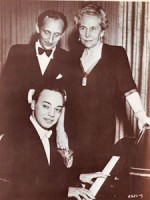Title
At the age of 19, Seymour Lipkin won the top prize in the prestigious Rachmaninoff International Piano Competition, launching a career that has included performing with most major American orchestras, as well as extensive solo and chamber music appearances. He will celebrate the 60th anniversary of the occasion with a recital this month, joined by pianist Robert McDonald, violinist Ronald Copes, violist Samuel Rhodes, and cellist Joel Krosnick. Prior to the concert, Mr. Lipkin shared some personal reflections with The Juilliard Journal.
Body
Sixty years is a long time, and much has changed during that period. In 1948 there were only two or three competitions of major scope; doing well in one of them attracted a great deal of attention and more or less guaranteed the major start of a concert career. Now the number of competitions has proliferated to such an extent that it seems as if every city in the world has one of its own; to win one of them is no longer enough to guarantee attention. One really has to go after two or three to get a career moving. (Of course, there are fine artists who have managed perfectly well without any prizes at all.)
My own relation to the Rachmaninoff Competition had its amusing aspects. When I was in my last student year at Curtis, I never thought I could measure up to its standards. Then I was asked to play the second-piano accompaniments for the local regional auditions and, in listening to the contestants, I thought to myself, “Maybe I’m not so far behind after all.” So I entered.
Another incentive was this: During my studies with Rudolf Serkin, he several times warned us, “Next week, Mr. Horowitz [referring to Vladimir Horowitz, with whom he was friends] is coming to listen to all of you.” (Subtext: Go home and practice.) Well, of course, Horowitz never showed up. When the judges for the Rachmaninoff Competition were announced, there he was! I thought, “Finally, there is a chance to play for Horowitz.” So I went home and practiced … a lot.
When he stood on the Carnegie Hall stage and called out my name as the winner, all I could think of was, “Oh, my God, how much I’m going to have to practice!”
Recently a student asked me to listen to a Rachmaninoff sonata, saying, “I understand you are an expert on Rachmaninoff.” I wanted to laugh, because I am no such thing—but I did not wish to disillusion her, so I said nothing and just listened. She, obviously, even at this distance in time, was referring to the competition and had misunderstood its purpose; it was to commemorate Rachmaninoff as a pianist. My own contribution to it consisted of very little of his music, but mostly Bach, Beethoven, Schumann, Liszt, Mozart, and Tchaikovsky. (Two other competitions were originally planned, to honor Rachmaninoff respectively as a conductor and composer, but these never took place.)
So it seems very appropriate that my concert on October 20 consists of music by Schubert and Mozart. Practicing aside, it will give me the greatest pleasure to share the concert with my respected and admired friends, all of whom I have known for so long (in some cases, about 40 years). In the meantime, I guess we’ve all practiced quite a lot.





